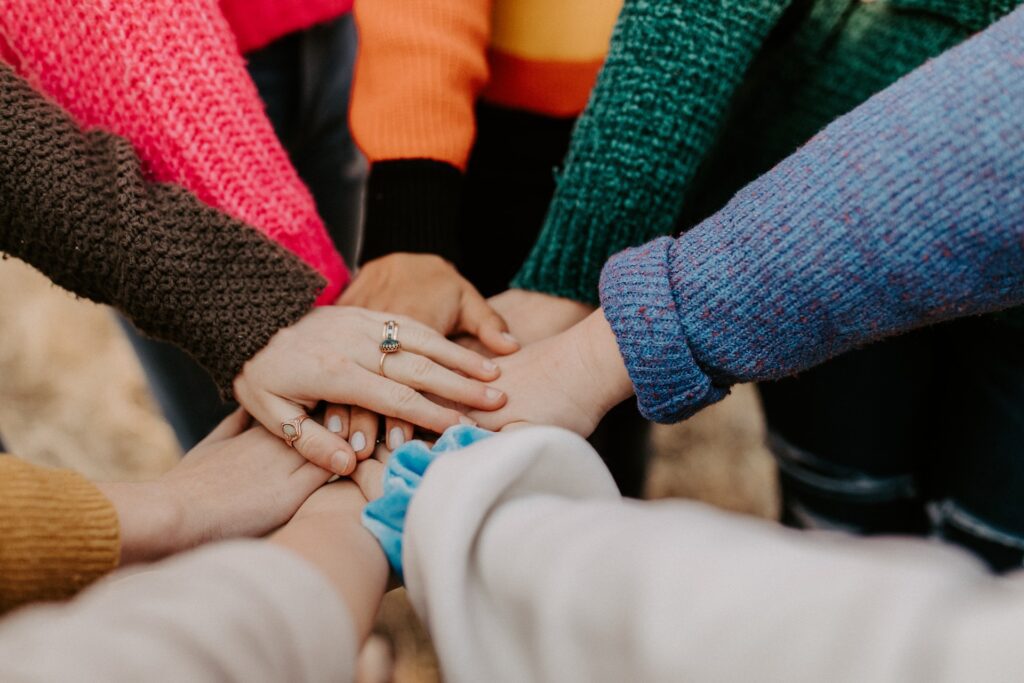
We all know it, right? Social support is important. It’s even essential for living a good life
Having enough good social connections has been linked to so many benefits, including improved resilience, better mental health, decreased risk of some diseases, and longer life.
Most caregivers know this, but how do you make things better?
To answer that question, let’s talk about some of the specific challenges caregivers face and how we might solve them. As you’ll see, women’s circles have untapped power to act to support and empower caregivers. You might even say that women’s circles for caregivers make everything better.
Why Caregivers Struggle With Social Support
Caregivers Are Often Physically Isolated
Anyone living with an aging parent will know this one – it’s often difficult to get out of the house. Shockingly difficult.
This is particularly true for seniors who can’t be left alone. Here, getting out requires organizing someone else to look after them and trusting that they do a good job.
Doing so is even tougher with difficult aging parents and those who don’t want to be left with anyone other than you. Sometimes figuring everything out just becomes too much. It might seem much easier to stay at home.
You Don’t Have Enough Time And Energy
Caregivers often struggle with both time and energy.
After all, you have an insane number of things on your plate. It’s often hard enough to find time for all of these, much less to start adding things on.
This is one reason why caregivers struggle so much with self-care.
And, being social takes more time and energy than many other practices. You’ll often need to organize the event and leave home to attend it.
Doing so is overwhelming at the best of times. It’s even worse if people cancel on your or if there’s a crisis with your aging parent.
Bad Experiences Can Be Off Putting
Social interactions are always hit-and-miss.
Sometimes they will be amazing and lift you up. Other times it might be difficult and draining, leaving you feeling worse than before.
The bad experiences are incredibly frustrating. After all, you don’t have much time or energy to spare. It’s easy to resent and avoid anything that reduces your available energy.
Even a single bad experience might put you off the idea. A few might be enough to stop you from trying again.
Others Don’t ‘Get’ It
When I was a caregiver, the social interactions I once enjoyed quickly became overwhelming (the same was true after caregiving as well).
People meant well but didn’t know how to respond to my challenging experiences. Some would ask questions, especially at first, while others simply responded with feel good affirmations.
Not talking about being a caregiver wasn’t any better. I found I had barely anything to contribute and felt left out of all the ‘normal’ conversations. Imagine trying to listen to people complain about parking tickets or a rude boss when you’ve been up most of the night dealing with incontinence disasters.
Connections Aren’t Great For Non-Caregivers Either
We live in funny times.
On one hand, technology makes social connection easier than it has ever been before. Yet, many of us actually end up more isolated.
The problem is that technology promotes superficial social connections. Sure, sharing photos and having conversations over social media is easy, but those connections don’t have the same depth as in-person friendships.
That distinction is easy to miss, so sometimes we rely too much on those digital friendships and don’t connect enough in person.
Plus, our modern fast-paced world doesn’t prioritize slow and high-quality friendships. It has a focus on fast and efficient instead, an approach that can leave us feeling very lonely.
There Aren’t Many Helpful Options
Finally, finding the right social connections can be tough, especially if you’ve lost touch with many old friends.
Social groups are normally the place to turn, including singles groups, clubs for hobbies, book clubs, fellowship through church, and the like. However, most of those groups aren’t tailored toward caregivers at all.
You can still go and find benefits – plenty of people do.
It might just take a while to find a group that works well for you.
If you want to engage in social groups, look for groups where you have a passion in common or a shared goal. This way, the conversations don’t constantly revolve around how everyone is doing and what has happened this week.
The main exception is caregiver support groups. These groups can be powerful (and we thoroughly recommend joining one). Still… they’re only one part of the equation.
Sometimes their focus on caregiving will be a bit much. You need to talk about other aspects of your life and passions too.
The Importance of Social Support
With so many challenges, social support might seem overrated.
But, it’s actually critical. Research consistently shows that social support makes us more resilient to stress and can promote physical health. In contrast, social isolation and loneliness raise the risk of depression, fatigue, and physical health issues.
The benefits of social support persist despite all the dramas that go with human relationships. This means that the process is still worth it, even when there are plenty of bad days (for more details, check out the book Lost Connections).
The Power of Women’s Circles for Caregivers

So, you’ve heard about women’s groups, right? These are simply groups of women that gather for a shared purpose. Some have a hobby in common, while others might be focused on self-help, community service, advocacy, or some other angle.
Women’s circles are a little different.
These are intentionally created as safe spaces where women can feel seen, heard, and supported through their journey.
So, how can these circles help?
There’s A Focus On Support
Unlike regular social groups, women’s circles are designed with support in mind. Many will have specific practices in place to hold space for women.
This is much more powerful than a regular social group or even than lunch with friends.
Some Circles Will Avoid Advice
My biggest surprise when joining a women’s circle was that advice was discouraged. Instead, the emphasis was on listening and holding space for one another.
I was disappointed at first. Yet, the more I thought about it, the more powerful the approach seemed – especially for caregivers.
Think about it. Unasked for advice is one of the most frustrating things ever. Unasked for caregiving advice is even worse, as many people don’t understand the situation at all, so they’re giving unhelpful unasked for advice.
This practice will vary between circles. Some may encourage you to state whether you want advice or not, while others may default to advice and allow you to request otherwise.
There’s Much-Needed Depth
Feeling seen and understood is a crucial part of social connection. It might even matter more than the number of people you engage with.
Part of this is having conversations at depth. Here, you’re going far beyond the 30 second answer to “how are you?” or talking about what has happened in the past week.
Exactly what you talk about varies depending on the group and the day. But, you might dig into aspirations, challenges, emotional health, sexual topics, or any number of other areas.
Sometimes the topic doesn’t even matter. The power comes from the chance to share deeply personal information and to have other people listen, affirm, and support.
They Often Have Structure
Women’s circles often have some type of structure.
The structure often helps to create a safe space, so you can be confident that you’ll be heard and accepted – as you are. Many groups will even have rules that allow people to share strong emotions safely.
There may also be steps to make sure the end of the group isn’t overwhelming, such as rituals to focus on positive or cleansing perspectives.
The Chance For Bonding
Meeting regularly gives you the chance to develop deeper connections with the members of your group and learn more about each other.
Some groups even go for years, if not decades, giving women the chance to bond and connect through some of the biggest changes and challenges that they face throughout their lives.
What If You Can’t Find A Women’s Circle?
Women’s circles are trending, but they’re not everywhere. Even if there are established groups in your area, they might not be accepting new members.
If that’s the case, you could look at starting your own group. There are resources online to help you get started. You can also follow your own instincts. There isn’t a right and wrong anyway, and every circle is different.
Starting your own group also allows you to set it up in a way that helps you. You might even choose to be the host, so that other women come to you. That’s a powerful option if it’s tricky to leave a loved one alone.
Final Thoughts
It’s easy to miss the importance of social connections when you’re buried in caregiving. I get it. Connecting with others can seem overwhelming, especially when they just don’t understand what you’re dealing with.
Women’s circles for caregivers aren’t the perfect solution. They come with their own challenges and can sometimes be draining. But, they’re also a powerful angle, one that can offer a surprising amount of support.
Feeling Overwhelmed?
Check out our Caregiving Consulting service for personalized support and guidance.

Leave a Reply